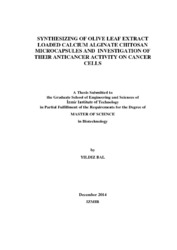Please use this identifier to cite or link to this item:
https://hdl.handle.net/11147/4292| Title: | Synthesizing of Olive Leaf Exteact Loaded Calcium Alginate Chitosan Microcapsules and Investigation of Their Anticancer Activity on Cancer Cells | Other Titles: | Zeytin Yaprağı Ekstraktı Yüklenmiş Kalsium Aljinat Kitosan Mikrokapsüllerin Sentezlenmesi ve Kanser Hücreleri Üzerindeki Antikanser Aktivitelerinin İncelenmesi | Authors: | Bal, Yıldız | Advisors: | Şanlı Mohamed, Gülşah Bayraktar, Oğuz |
Keywords: | Olive leaf extraction Encapsulation Anticancer activity |
Publisher: | Izmir Institute of Technology | Source: | Bal, Y. (2014). Synthesizing of olive leaf exteact loaded calcium alginate chitosan microcapsules and investigation of their anticancer activity on cancer cells. Unpublished master's thesis, İzmir, Turkey | Abstract: | As we all know there are too many diseases which can be counted as fatal. But cancer is one of the most terrifying one for human race. Moreover, breast cancer in females and lung cancer in males are the most common cancer types. Although there are so many treatment methods, they have severe side effects. On the other hand, mother earth is so willing to give her hand and open all of the sources she got. O. europaea is one of the most important valuable source and Mediterranean area is blessed with that source. Olive and olive products may play an important role in cancer prevention. However, there are some limitations on their direct usage. Since encapsulation technology can seal valuable things into small capsules, it can be used to alleviate these limitations. In this study, the aim was figure the limitations of olive leaf extract (OLE) out with the encapsulation technology and enhance the effectiveness. Moreover, assess this effectiveness on cancer cell lines. Thus, OLE loaded calcium alginate (OLE-Ca-Alg) capsules produced by ionic-crosslinking. To limit the loss of OLE, capsules were coated with chitosan (CS) and OLE loaded chitosan calcium alginate (OLE-CS-Ca-Alg) were produced–two stage procedure. Optimization studies and characterization of the microcapsules were carried out. To investigate their anticancer effectiveness cytotoxicity, cell cycle and apoptosis analysis were performed for lung and breast cancer cell lines besides cytotoxic effects of the capsules were compared with healthy cell line. Additionally, visual observations were done by optical microscopy. Consequently, results showed OLE loaded capsules are more cytotoxic than free OLE. These effects were supported with cell cycle, apoptosis analysis and optical microscopy observations. In contrast none of compounds was cytotoxic for healthy cells. Thus, it can be concluded that our results will enhance the drug industry as it is a new approach for anticancer drugs and biocompatible material for biomedical applications. | Description: | Thesis (Master)--Izmir Institute of Technology, Biotechnology, Izmir, 2014 Includes bibliographical references (leaves: 84-89) Text in English; Abstract: Turkish and English xii, 95 leaves |
URI: | http://hdl.handle.net/11147/4292 |
| Appears in Collections: | Master Degree / Yüksek Lisans Tezleri |
Files in This Item:
| File | Description | Size | Format | |
|---|---|---|---|---|
| T001315.pdf | MasterThesis | 4.29 MB | Adobe PDF |  View/Open |
CORE Recommender
Items in GCRIS Repository are protected by copyright, with all rights reserved, unless otherwise indicated.